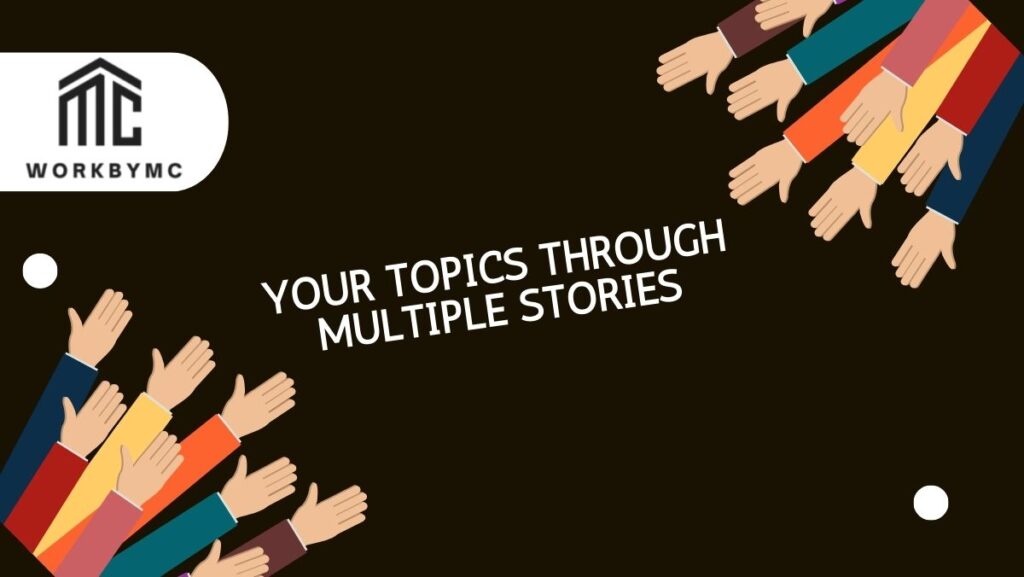Today, there is an overwhelming amount of information about almost any subject one can imagine present in the virtual sphere. Even if it is in the field of science, history, art, or a personal interest, utilizing a variety of stories to learn in a subject generally proves to greatly complement your experience. It makes you look at matters from a different angle making you to be as open and receptive as possible to all the stakeholders. In this article we will discuss information about your topics | multiple stories and its features.
The Power of Storytelling in Deepening Understanding : your topics | multiple stories
Oral and in particular narrative communication have been a tool of intrapsychic Types of narratives interaction since times immemorial. Whether it is while reading myths of ancient civilizations or acts of war in today’s newspapers, stories are how we understand our context. However, it is important to point out that narrative is not only a means of having fun; it involves education, as well as emotional involvement.
Cognitive Connection Motivates Cognition
Among all the strengths of storytelling, the most crucial is that storytelling helps to elicit an emotional response. Telling messages that relate to individuals close to the audience are always unique and memorable. It is however worth stating that the moment a topic is presented under a story, details about it whether concerning development or otherwise gets much easier to be passed within the emotional realm that is presented.
Simplifying Complex Ideas
When discussing matters such as different theories in science or history, events and actions may appear daunting. It is so effective that telling a story is actually a good way of explaining such concepts into more manageable chunks.
Why Multiple Stories Matter
It is impossible to cover all aspects of an issue through a single story. Thus, by accepting many stories, you come up with a holistic understanding of a situation. It enables the subject to be comprehend from many angles which assists in getting an overall knowledge on any given subject.
Cultural Diversity: A Window Into Different Perspectives
Stories are as diverse as people and are configured the way society that a certain tale belongs to organizes it. Often there is no one cultural perspective on an issue which makes the search for different cultural perspectives fruitful.
Example: The concept of heroism is portrayed differently across cultures. Western superheroes like Superman are often characterized by their individualism, while Eastern folklore heroes might embody collective values, teamwork, or moral teachings. By examining these differing portrayals, we gain a richer understanding of the societal values that shape these characters.
Contrasting Viewpoints Challenge Assumptions
One of the strengths of engaging with many stories is that they foster the development of the thinking process. When you interact with someone different with whom you have a disagreement, you get to think critically and put your prejudices to test.
Example: Understanding of a historical event from perceiving the opinions of different involved nations makes it possible to reveal one’s preconceptions.
Topics That Benefit from Multiple Story Approaches

As this kind of approach can be used in any subject, there are some subjects that are more suited to be approached by collecting narratives. These subjects are frequently not easy, nuanced and contain influences and perspectives that reflect all sorts of individuals.
Historical Events
Historians are always producing various stories through which the society can afford to look at events in the past. All the given narratives from a soldier, a civilian or a politician have added dimensions to allow us to understand histories.
Example: The global event that can be best illustrated by the concept of multiple voices is World War II as people of different ages, genders, roles, and nationalities are capable of conveying a much richer experience of the war present in the material.
Social Issues: Seeing from Different Angles
Poverty, homelessness, inequality and other such socio-economic issues within a society are realized and developed by various causes and it can best be explained by hearing out richer narratives from those on the receiving end.
Example: While dealing with the topic of homelessness it is necessary to look at the matter from three aspects – the Human angle that is the homeless themselves and the policies pending on them and the third angle is the organizations which are in the service of ending the problem. Every case enriches understanding of the problem’s multifaceted nature and contributes to its analysis.
Scientific Discoveries: Reality of Human Behind Facts
It is widely believed that scientific advancements are duked by research and experiments. However, behind scientific discoveries lies a story of struggle, concepts, decision making of a particular moral question, cooperation.
Example: The development of vaccines, particularly in response to global health crises, involves more than just scientific innovation. It encompasses ethical considerations, struggles with misinformation, and the global effort to ensure widespread access, all of which are important stories that enhance our understanding of the scientific journey.
How Multiple Stories Enhance Learning
When you integrate several stories into your learning method, it could improve the level of learning and understanding. Notes can turn boring, abstract elements into vivid narratives with which the learners can easily identify themselves.
Towards the Use of Narratives in Learning and Education
Current educators can also gain benefit from it in that they can use stories from real life hence making their lessons more relevant to the students. Your Topics | Multiple Stories method can be very helpful where it is needed to make abstractions more comprehensible.
Fostering Critical Thinking and Analytical Skills
When different stories are analyzed, it is possible to enable the students to learn about detecting bias, comparing different views, and thinking critically upon the information provided.
Creating and Finding Your Topics | Multiple Stories
If you are to fully investigate a topic through one story you must proactively look for the other stories for it to be complete. This means being intentionally selective in what you consume and who you interact with in this sphere.
Diverse Media Consumption: Expanding Your Horizon
If there is more than one story to be collected that would be the easiest way to do so is through consuming more contents from different media. Consuming such material as books and documentaries, podcasts and interviews helps you to see a certain topic from multiple sides.
Engaging with Communities: Sharing Experiences
Other ways of finding the variety of stories include, for instance, joining the online community, discussion forum, or a local group. It is an opportunity to be exposed to other people and circumstances that make you grow wiser through learning with other people.
Reflective Storytelling: Sharing Your Own Narrative
It also helps to enrich knowledge about a topic by sharing your own stories and experiences. For instance, you may find blogging to write down your own, and the readers to come forward with their stories, which will improve everyone’s database.
Conclusion
This is a valuable approach to become closer to Your Topics | Multiple Stories and make the listeners more empathetic and self-developed. You can then choose to read and watch different stories so you can learn more and become better informed and less biassed. Whether you’re a student, professional, or lifelong learner, integrating multiple stories into your exploration of topics can transform the way you perceive the world. This approach not only broadens your intellectual horizon but also nurtures a lifelong passion for learning.
FAQs
Storytelling breaks down complicated thoughts; it’s an emotion eliciter and a facilitator in the relationship with the matter in a way that creates a sense of comprehension or memory.
A lot of stories will come across various viewpoints, improve thought-critical, and lead to well-roundedness when issues are raised on assumptions and prejudices.
Historical events, social issues, and scientific discoveries are particularly suited for multiple-story approaches as they involve diverse perspectives and nuanced complexities.
You can look into diverse media like books, documentaries, podcasts, and interviews, engage with communities through forums, and share personal narratives to uncover various perspectives.
Challenges include information overload, confirmation of biases, and the evaluation of credibility sources. These can only be overcome by careful selection and cross-referencing of information.
Also read About:

